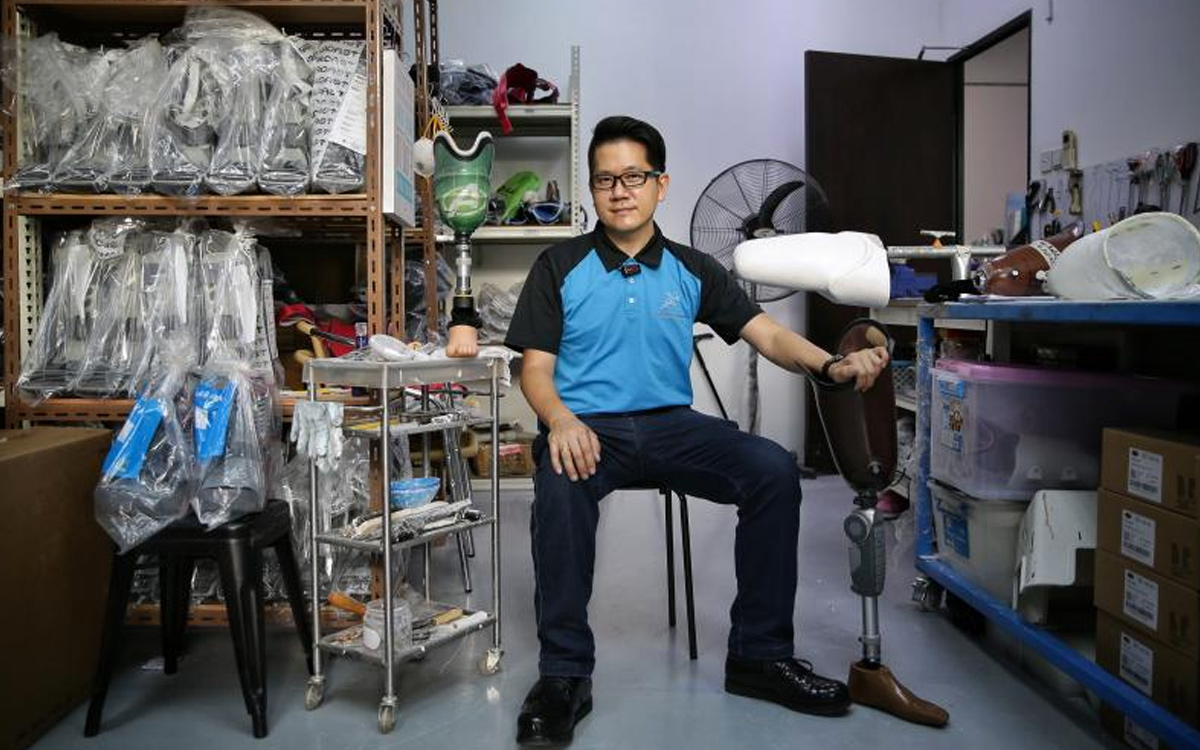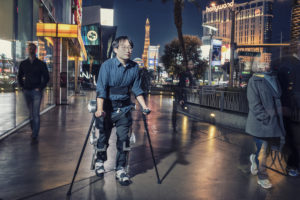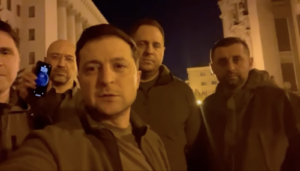It was a hot January afternoon in 2013. The sun was beating down on Desmond Lim as he sat astride his Kawasaki Versys 1000, waiting for the traffic light to turn green on a country road near Kanchanaburi.
The former flight attendant was heading back to Bangkok after a month-long motorbike sojourn which had taken him from Singapore to Thailand.
A sudden impact from behind threw him to the ground. It was a truck driven by a man too engrossed with his phone to notice Desmond. The 43-year-old recalls: “I saw tyres, they went over me. I saw tyres again, turned on my side and got run over again.”
He lay groaning on the hot tarmac for more than six hours before an ambulance arrived.
For over a year, the hospital was his home because his injuries – fractured pelvis, broken right leg and organs which had shifted – were horrific. Doctors told him he would never walk again, which threw him into a deep malaise.
But Desmond eventually walked again, thanks to his grit and the love and support of his family and several medical workers.
Today, he walks with the help of a brace because his right leg – the lower part is paralysed – is now shorter than the left. “There is pain when I sit or stand but I have learnt how to manage it,” he says.
With his employability limited, he got a loan from his sister and used his savings to start The Prosthetic Company three years ago. The social enterprise specialises in prosthetics and orthotic equipment and services. The outfit has since grown to become one of the largest of its kind here and has expanded into Malaysia.
Knowing what his clients need has helped the business, he says.
“I’ve been through it and I know what it is like. I understand how they feel, I listen and try my best to give them what they want.”
Because of his family circumstances, Desmond became independent and started earning his own keep at a young age. By the time he was 15, he was working full time as a banquet staff in a hotel along Dunearn Road, pulling more than $1,500 a month including overtime.
“I’d go to school in the morning and work from 3pm until 11pm every day,” he says, adding that the hotel provided him with a room.
Before the accident, Desmond – a purser at Cathay Pacific Airways by then – enjoyed flying because it was relatively stress-free and gave the motorbiking enthusiast opportunities to take long rides to Malaysia and the region.
The day his life changed is seared in his memory.
The accident attracted a crowd and caused a big traffic jam, one reason why the ambulance took six hours to reach the scene.
“It was a hot day. I was burnt because the ground was so hot. Some people sheltered me with umbrellas and poured water on the ground to cool it. I couldn’t move my body, only my hands and my mouth,” he says.
“I don’t know how to describe the pain. I can only say I felt as though I was dying. I thought about whether I would die, what I had done and not done.”
He was taken to a provincial hospital which looked like it had not been renovated since the 1960s.
“I was rolled into an operating theatre which had fans,” he says, adding that none of the medical staff spoke English.
By then, his riding companions had come to know of his accident and informed his family in Singapore.
Because the hospital was not equipped to deal with his injuries, he had to endure another two-hour bumpy ride to a hospital in Bangkok where his mother and one of his sisters were waiting anxiously.
“I’d been conscious throughout, my eyes were wide open for more than 10 hours. But when I saw my mother, I hyperventilated, cried and then blacked out,” he says.
The next time he regained full consciousness was several weeks later at Singapore General Hospital (SGH).
He did not get to go home for the next 15 months.
“I couldn’t sit up or turn sideways for the first eight months. There were pressure sores all over my back and heels,” says Desmond who went through half a dozen operations.

Source: Kevin Lim
For nearly a year, the sight of wheels – on TV or in newspapers – would set off anxiety attacks.
“I felt lost, I didn’t want to talk to anyone,” he says, adding that he had to see a psychiatrist.
He credits his family and several hospital staff for getting him out of depression.
“Some of the physiotherapists went out of their way to help me. They bought me food and visited me on their days off to encourage me.”
To regain his mobility, he started swimming and walking up and down from his family home on the 11th floor of his flat, even though it took him a few hours.
“I’ve been through it and I know what it is like. I understand how they feel, I listen and try my best to give them what they want.”
He started The Prosthetic Company in 2016 because he felt that the variety of prosthetic and orthotic aids here was limited.
After drawing up a proper business plan, he approached his eldest sister, a professor at a local university, for financial help. By then, Desmond had attended short courses on prosthetics and related subjects in Europe and China.
“I’m not certified and all the doctors and clients I deal with know that. But my staff are. I have good technical knowledge, I know how to troubleshoot. My job is to deal with clients and run the business. We’ve not had a single complaint ever since we started,” he says proudly.
Because others have helped him, Desmond wants to pass the kindness on.
When he recovered, he donated blood several times and took part in support groups for those who have lost their limbs or mobility. As founder of The Prosthetic Company, he now works with different associations to offer free prosthetics to those who can’t afford them.
Life is unpredictable and we have to live it well, he says.
“As long as you’re hardworking and you make decisions not just to benefit yourself, things will turn out well.”
This story by Wong Kim Hoh was originally published by the Straits Times on June 16.
This inspirational tale is part of Wong Kim Hoh’s award-winning profile series, ‘It Changed My Life’, in The Sunday Times. Named Straits Times Journalist of the Year in 2016, the Senior Writer has persuaded many to share how they overcame the darkest moments of their lives. In a book that compiles interviews from Kim Hoh’s column, former ST Deputy Editor Alan John said: “The greatest mystery to me is where Kim Hoh finds this never-ending parade of memorable individuals with remarkable life lessons of determination, strength and resilience.” Kim Hoh has also written other books, one of which is Big Hearts, Big Dreams, a compilation of inspiring stories about the 2015 and 2016 ST Singaporean of the Year nominees. “I get a lot of readers telling me that the stories have moved them, inspired them and galvanised them to do more,” he said. “In some ways, I guess what they are telling me is that the stories have changed their lives.”




